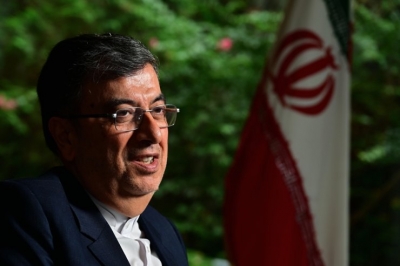Seoul suspended accounts of the Central Bank of Iran at the Industrial Bank of Korea and Woori Bank, which had been used to receive payments for Iranian oil. The accounts were won-denominated to avoid the U.S. sanctions on Iran, and Iran used the Korean accounts to pay for the import of non-sanction products from Korea and other humanitarian items exempt from sanctions.
"Unfortunately, Iran-Korea relations were influenced by the Trump administration's unilateral withdrawal from the nuclear deal in 2018," Shabestari said.
"The U.S. withdrew from the negotiations and imposed illegal, inhumane sanctions on Iran, and Korea participating in the sanctions risked its bilateral relations with Iran."
Despite Tehran's repeated requests to release the frozen assets, Seoul has been maintaining its stance that it will allow Iran to reclaim its funds in Korean banks only when the U.S. sanctions on Iran are lifted. Though it is not a member of the Joint Comprehensive Plan of Action (JCPOA), Korea supports the restoration of the 2015 nuclear deal among China, France, Germany, Russia, the United Kingdom and Iran.
Ambassador Shabestari noted that the sanctions are not part of an internationally agreed procedure but just a measure taken by the U.S., and Iran continues to trade with other countries around the world, with its annual non-oil exchanges reaching $100 billion last year.
"However, the bilateral trade between Iran and Korea is nearly zero, despite the large amount of Iranian assets frozen in Korea," he said.
"Honestly speaking, Korea's image is getting damaged in Iran. We trusted Korea and deposited our money at Korean banks, but we have been stripped of access to our money in Korea. While our money is restricted in Korea, we went through economic difficulties and were hit by COVID-19 amid financial hardship. We just wanted to import non-sanctioned products such as medicine and medical devices (from Korea using the Iranian funds here), but we couldn't."
The ambassador also mentioned the missed opportunities for Korean companies in the Iranian market.
"Due to Korea's political policy, Korean companies exited Iran's market four years ago and they are losing out in the Iranian market, one of the largest economies in the Middle East," Shabestari said.
"For example, according to statistics, over 8 million Samsung mobile phones were sold in Iran. These were reimported into Iran via third countries. A mobile phone is a non-sanctioned product. These business ties could take place directly between Iran and Korea, using the Iranian assets in Korean banks."
He emphasized that Iran has been making efforts to mend ties and develop relations with Korea over the last four years, including two letters from the Iranian president to his Korean counterpart as well as talks at the foreign minister and vice minister levels.
"I want to highlight that Iran has the will to return to the amicable relations with Korea that we had in the past. The Yoon administration emphasized improving ties with Iran when unfavorable measures in the past four years harmed bilateral ties between the two countries," the ambassador said.
"We have told the Korean side that it is our request that any third party not engage in our bilateral relations because the relations between Iran and Korea are important. Therefore we try our best to resolve the pending issue. We don't want any third party engaging with this issue."
He added that the ongoing negotiations on reviving the nuclear deal mediated by a third party do not have anything to do with the frozen funds in Korea.
"According to the spokesperson of the Iranian Ministry of Foreign Affairs, these frozen assets are between Iran and Korea and not related to any other agendas discussed by other countries," he said. "We are in talks through a third party and we want this nuclear deal to be a safety net for us. We have an experience of the U.S. walking away from the deal and then imposing sanctions against us. We don't want to be in a situation like this ever again."
The ambassador noted that this coming Oct. 23 marks the 60th anniversary of diplomatic ties between Iran and Korea.
"(The date) is important for us and we are looking to celebrate the occasion here. We hope, before Oct. 23, that we see some progress from the Korean side toward resolving the problem and the pending issues. I hope that as soon as possible the new government of Korea try their best as they promised," he said.
"I think we have to hand down amicable bilateral relations between Iran and Korea to the next generation, not the current prickly relations."

